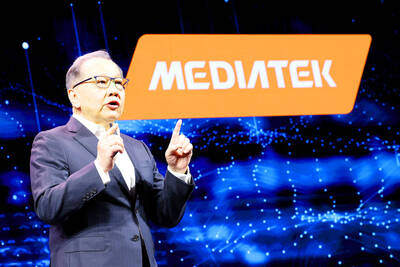The official manufacturing purchasing managers’ index (PMI) posted 58.7 last month, falling from 61 in April, as local manufacturers reported a softer, but solid improvement in operating conditions, the Chung-Hua Institution for Economic Research (CIER, 中華經濟研究院) said yesterday.
The latest PMI data lent support to a continued recovery in the global technology cycle, but uncertainty has mounted over the launch of Apple Inc’s next iPhone model due to reported technology snags, CIER president Wu Chung-shu (吳中書) told a news conference.
Local and international media have said Apple might have to delay mass production of its new iPhone from September to October or November, as it has failed to overcome hurdles related to touch-identification features.
“Uncertainty gains strength and diversity as the high sales season approaches,” Wu said.
Local technology firms supply chips, camera lenses, casings, batteries, touch screens and other critical components used in iPhones and might take a hit if Apple delays the production of the new model.
Regardless of the new iPhone’s launch, sales of technology products generally fare better in the second half compared with the first, Wu said, adding that the seasonal trend has remained on track so far this year.
The PMI aims to gauge the health of the manufacturing industry, with scores above 50 indicating expansion and scores below the threshold suggesting contraction.
Despite last month’s decline, the leading barometer rose for the 15th consecutive month as firms in all sectors reported business expansions, thanks to robust demand from clients at home and abroad, the CIER survey found.
The critical sub-index on new orders registered 57.3 last month even though firms involved in the supply of basic materials had slipped into contraction mode, according to the survey.
“Seasonality varies for different sectors,” Wu said.
Makers of electronic and optical devices, the main growth driver for the nation’s economy, showed the best performance with a PMI of 63.2, the survey found.
The output sub-index shed 5.2 points to 60 last month, while employment gained 0.4 percentage points to 60.4, both comfortably above the neutral mark, it said.
Most firms have positive views about their business outlook, tipping the six-month outlook sub-index to 61.1, from 63.2 in April.
The non-manufacturing industry also benefited from the recovering economy with the non-manufacturing index falling from April’s 56.3 to 55.4 last month, a separate report found.
While domestic demand accounts for a lion’s share of GDP, exports tend to affect its showing and the uptrend reflects benign external demand, Wu said.

Taiwanese suppliers to Taiwan Semiconductor Manufacturing Co. (TSMC, 台積電) are expected to follow the contract chipmaker’s step to invest in the US, but their relocation may be seven to eight years away, Minister of Economic Affairs J.W. Kuo (郭智輝) said yesterday. When asked by opposition Chinese Nationalist Party (KMT) Legislator Niu Hsu-ting (牛煦庭) in the legislature about growing concerns that TSMC’s huge investments in the US will prompt its suppliers to follow suit, Kuo said based on the chipmaker’s current limited production volume, it is unlikely to lead its supply chain to go there for now. “Unless TSMC completes its planned six

Intel Corp has named Tasha Chuang (莊蓓瑜) to lead Intel Taiwan in a bid to reinforce relations between the company and its Taiwanese partners. The appointment of Chuang as general manager for Intel Taiwan takes effect on Thursday, the firm said in a statement yesterday. Chuang is to lead her team in Taiwan to pursue product development and sales growth in an effort to reinforce the company’s ties with its partners and clients, Intel said. Chuang was previously in charge of managing Intel’s ties with leading Taiwanese PC brand Asustek Computer Inc (華碩), which included helping Asustek strengthen its global businesses, the company

Power supply and electronic components maker Delta Electronics Inc (台達電) yesterday said second-quarter revenue is expected to surpass the first quarter, which rose 30 percent year-on-year to NT$118.92 billion (US$3.71 billion). Revenue this quarter is likely to grow, as US clients have front-loaded orders ahead of US President Donald Trump’s planned tariffs on Taiwanese goods, Delta chairman Ping Cheng (鄭平) said at an earnings conference in Taipei, referring to the 90-day pause in tariff implementation Trump announced on April 9. While situations in the third and fourth quarters remain unclear, “We will not halt our long-term deployments and do not plan to

NOT OVERLY PESSIMISTIC: While consumer electronics demand remains volatile, MediaTek CEO Rick Tsai said that tariffs would have limited effect on the company Chip designer MediaTek Inc (聯發科) yesterday said revenue this quarter would contract by 4 percent sequentially in the worst-case scenario on softer smartphone demand. Revenue is expected to be between NT$147.2 billion and NT$159.4 billion (US$4.6 billion-US$4.98 billion), compared with NT$153.31 billion last quarter, the company said. MediaTek said demand for smartphone chips would be flat or slide sequentially this quarter, while demand for smart devices and power chips would go up. Mobile phone chips made up 56 percent of the company’s total revenue last quarter. Gross margin of 46 to 49 percent is forecast for this quarter, compared with 48.1 percent last